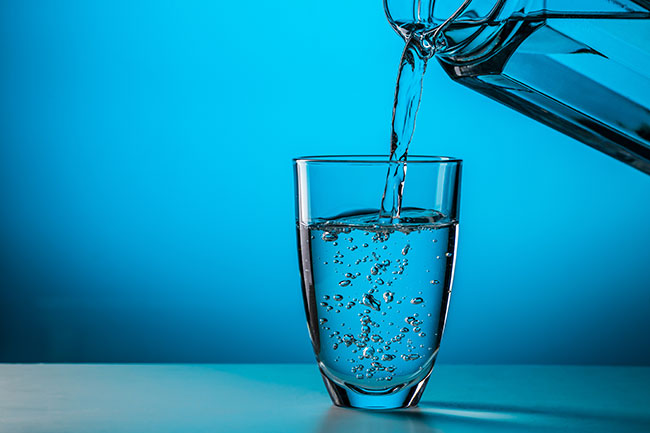Because Natural Mineralized

Elmacık Water reaches our factory from our source, which is protected against all kinds of contamination and external factors, through the transmission line in accordance with the Turkish Food Codex; it is filled into specially designed bottles untouched in the naturalness from its source.
Due to the minerals and other components it contains, Elmacık Water has been approved as “Natural Mineral Water” by the Ministry of Health. When drunk 2-2.5 liters a day with its balanced mineral structure, it not only meets the daily water requirement, but also contributes to meeting the daily mineral requirement thanks to its easy absorption by the body and its total mineral value of 178.2 mg/L.

What is a mineral?
Minerals are chemical compounds naturally occurring in the layers of the earth that are used as raw materials to produce metals, consisting of plus-valent metals and minus-valent anions that are not produced by living organisms. For example, substances such as limestone, marble and granite are composed of minerals or are obtained from iron minerals and copper minerals. Iron minerals contain elements other than iron; we can say that minerals are the raw materials of metals found in nature.
What Does Natural Mineral Water Mean?
Natural mineral water means that it comes from nature, that is, no minerals have been added later, and the minerals have not been artificially enriched.
What Does Natural Mineral Water Mean?
Regular waters that have not had extra minerals added to them as the sun, that have not had excessive outbursts outside the boundaries during the year, and that have approximately the same mineral percentage.
Source: Regulation on Natural Mineral Waters, Official Gazette Published: Wednesday, December 1, 2004 Issue: 25657
Why is Natural Mineral Water Beneficial?
Minerals are very important for human life. Calcium and iron are found in human bone and blood loss. Similarly, metals from minerals play a major role in vital events such as nerve relations, muscle tension and relaxation.
Mineral-based substances are also needed for the enzymes and vitamins in our body to function. However, the logic that the more natural minerals there are, the more pleasant the water is is wrong. The maximum mineral levels that can be found in water are specified in the Regulation on Natural Mineral Waters.
The minerals in AOÇ Elmacık Natural Mineral Water are in proportions suitable for human health.
Which Natural Minerals Benefit Our Body and How?
As a result of the dissolution of minerals in the soil in water, or due to their passage to plants and animals, they reach humans through the food chain.
These products, called trace elements, play a vital role in the structuring of enzymes and vitamins necessary for the functioning of cells.
Some enzymes need elements such as iron, trace, cobalt, and therefore minerals in order to be active.
What are the Benefits of Calcium for the Human Body?
Calcium is very important for the human body. It plays a role in the erasure of bones in particular. It also plays an important role in many vital events from the functioning of nerve and muscle cells to blood clotting.
Most of the calcium needed for our body comes from milk and similar works. The most abundant metal in water is calcium.
According to the family of calcium in water, waters are classified as soft, medium hard and very hard. Magnesium, like calcium, is a substance that gives water efficiency. Hard water causes soap to foam less.
A.O.Ç. Elmacık Water is a very suitable water in terms of elements such as calcium and magnesium.
How Much Calcium Should a Child Take Daily? How Much of This Can They Take with Water?
Age Groups Daily Calcium Amount to Be Taken (mg)
0-6 months 210
7-12 months 270
1-3 years 500
4-8 years 800
9-18 years 1300
A glass of milk and yogurt contains 300 mg of calcium, and a matchbox of cheese contains 200 mg of calcium.
A person who drinks one liter of water a day takes 40 mg of calcium if he drinks water with a hardness of 10 French degrees. However, the body usually takes calcium from foods such as milk.
Source: http://www.cocukendokrindiyabet.org
How Much Daily Calcium Does an Adult Woman Need?
The daily calcium need of an adult is 800 mg.
While this need is 1000 mg before menopause, it increases to 1500 mg after menopause.
1000 mg per day is sufficient for those receiving estrogen treatment.
Calcium that cannot be taken with diet can be supported with ready-made tablets or supplements containing supplements.
A woman who drinks 1.5 liters of water takes approximately 60 mg of calcium per day.
Source: http://www.emekhuzurevi.com/osteoporoz.html
Do High Mineral Waters Cause Kidney Stones?
Kidney stones are an event related to the genetic structure of the person rather than the mineral structure of the water.
The hardness of the water has significant results regarding the formation of kidney stones only after the passage of 50 French times.
The pulses of drinking water are usually between 1-15.
Kidney stones are formed from excessive calcification in the fluids coming to the kidney.
Drinking plenty of water prevents excessive weakening of the kidneys.
Source: http://www.freedrinkingwater.com

